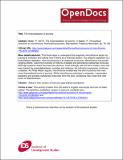The Financialisation of Poverty
Abstract
This book helps to understand the enigmatic microfinance sector by tracing its evolution and asking how it works as a financial system. Our present capitalism is a financialized capitalism, and microfinance is its response to poverty. Microfinance has broadranging
effects, reaching hundreds of millions of people and generating substantial revenues.
Although systemic flaws have become obvious, most strikingly with the 2010 Indian crisis that was marked by overindebtedness, suicides and violence, the industry's expansion continues unabated. As Philip Mader argues, microfinance heralds less the end of poverty than new, more financialized forms of poverty. While microfinance promises to empower, it generates discipline and extracts substantial resources from the poor, producing new crises and new forms of dispossession.
Citation
Mader, P. (2015) ‘The financialisation of poverty’, in Mader, P. The political economy of microfinance: financializing poverty, Basingstoke: Palgrave Macmillan, pp. 78-120Is part of series
Studies in the political economy of public policy;More details
http://www.palgrave.com/page/detail/the-political-economy-of-microfinance- /?K=9781137364203Library catalogue entry
http://bldscat.ids.ac.uk/cgi-bin/koha/opac-detail.pl?biblionumber=238206Rights holder
Palgrave MacmillanCollections
- IDS Research [1671]

